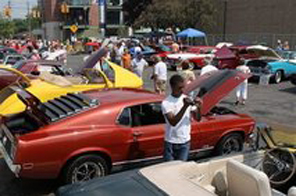Mich. cruisers worry days of classic cars are over
ROYAL OAK: Jack Beller's blue 1966 Corvette has the classic big-block engine and the enormous carburetor that make putting the keys in the ignition a roaring ode to muscle car history.
He and his classic ride have been coming to Saturday's Woodward Dream Cruise, billed by its sponsors as "the world's largest one-day celebration of car culture," since it began 15 years ago. But this year, as he sat against his wife Marilyn's arrest-me-red '62 Corvette, there was a depressing realization setting in: There may not be a successor to his beloved fleet of classic cars.
"This is gone," said Beller, 68, sweeping his hand across a parking lot along the cruise's Woodward Avenue route, where 100 other classic cars were lined up. "This is gone forever."
In a year when General Motors and Chrysler have taken a quick trip through bankruptcy court and are being supported with taxpayer dollars, this cruise had participants feeling more nostalgic than ever about their vehicles. With GM now pushing cars like the whispery-quiet electric Volt, destined to get 230 mpg, the thundering, fuel-guzzling beasts that marked America's love affair with the car are a dwindling breed, and a rare sight on the road.
As the industry turns toward more fuel-efficient and even electric vehicles, classic car owners worry the soul of the cars that symbolized personal freedom, speed, status and sex appeal have been lost. In their place, the highways are filled with identical sedans that hum along, one just like the other, none more spectacular than the next.
For a day, though, Woodward Avenue was given over to the strutting cars of yesteryear. An estimated 40,000 Dream Cruisers slowly drove up and down the event's 16-mile stretch in Detroit's suburbs, classic big-body Cadillacs swimming by with a murmur. A fleet of hot rods, engines announcing their presence long before they came into view, roared out of red lights as patrons at local bars cheered, sipping beers mid-morning. And amid it all, a few strange gems like the original MonkeeMobile, from a goofy 1960s sitcom featuring the pop-rock quartet the Monkees, drew smiles from the hundreds of visitors sitting in folding chairs along the route.
As they cruised, the classic car enthusiasts discussed whether any contemporary vehicles will reach the iconic status of their trusty rides. Sadly, the drivers say, today's cars just don't measure up to the wonders of old — making the cruise a bittersweet journey back to the Motor City's golden years.
"They're bellybutton cars — everybody's got one," said Bob Patrick, 74, of Warren while sitting next to his glossy red 1947 Plymouth Special Deluxe.
There are a lot of reasons the classic car culture may fade. While modern versions of muscle cars such as the Camaro and Corvette retain a good deal of their aesthetic appeal, the design concerns of the contemporary carmaker — including government safety regulations regarding crash readiness and a car's aerodynamic profile — can lead to visual similarity across models.
That makes "everything looks like a jellybean. Period," Beller said.
It also makes identifying a future generation of classic cars difficult. While cars known as "tuners" — typically foreign model cars like whose mystique stems from souped-up engines and agile handling — are often put forward as heirs to the classics throne, their skeptics abound.
"They'll throw 'em away and play with something else. There's nothing out there today that anybody wants to save," said Dave Sandow, 62, who was showing off his red 1970 Chevy El Camino.
Some who adore their conventionally classic car believe the definition of a classic is captured in childhood — and thus will continue to evolve generation to generation. So if a child looks out the window and sees a parade of fuel-efficient Toyota Prius models driving down the street, he may begin to consider that a "classic" when he gets older.
"The cool guys always had the cool cars and that's what you try to emulate," said Joe Ramsey, 58, of Sterling Heights, a former GM designer who owns a 1932 Ford. "It's what you grew up with."
There are some signs automakers aren't giving up on the influence of classic cars completely. There has been some convergence between the classic car culture and a more modern, technological, tuner-influenced brand, said Richard Shi, an American cultural historian who has studied car culture. This union is on display with the Chevrolet Volt, GM's electric vehicle slated to be released in 2010, which has a profile much closer to the Camaro than the comparatively mousey hybrid Toyota Prius.
"In some respects, the Volt is trying to be the best of both — the physical appearance of an American car but with the drive train of an increasingly eco-conscious public," said Shi, the president of Furman University in Greenville, S.C.
Even if the glory days of muscle cars is waning, some, like 16-year-old Kevin Duby, are still buying into muscle car culture. Duby, of Livonia, spent four years of savings on his 1979 Camaro. And despite what his friends might value in a new car, the allure of a flashy ride is worth a heavy price.
"I would rather work two jobs to drive that than a Prius," he said.






